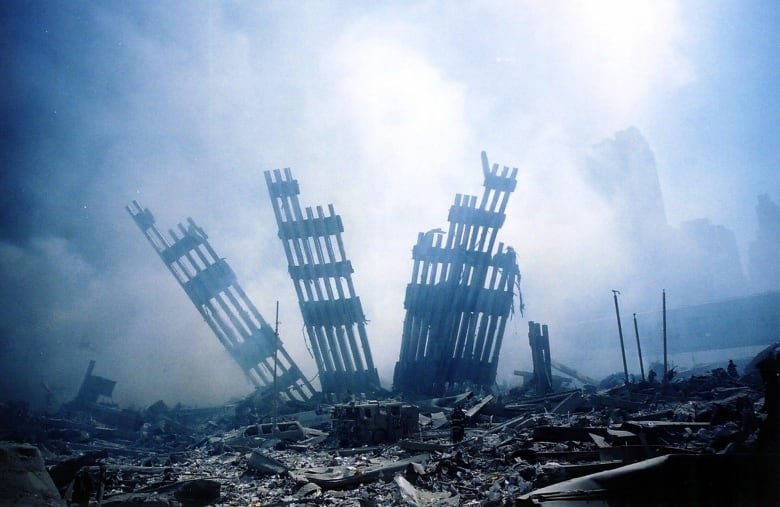A few weeks after the 9/11 attacks, 10-year-old Robert Soto slipped away from his Bronx home to visit Ground Zero.
"[He] went and hopped the subway and got within a few blocks of the World Trade Center and walked over, and looked at the pile," said C.J. Chivers, the veteran reporter who has written extensively on the wars that followed the attack.
"It was still smoldering then, and it was at an unimaginable scale for someone of his youth."
Soto vowed "to see to it that his city would not be attacked again," Chivers told The Current'sAnna Maria Tremonti. "He graduated young from high school at age 17, and joined the army."
Soto would become one of the 2.7 million U.S. troops deployed to Afghanistan and Iraq in the wars that followed. Chivers spent time in the Middle East covering those wars, where he met the young soldier. He tells Soto's story in his new book The Fighters: Americans in Combat in Afghanistan and Iraq, which he discussed on The Current.

|
Chivers' 'chip in the larger mosaic'
After the first plane hit the north tower on the morning of Sept. 11, 2001, Chivers was running toward Ground Zero thinking there had been a terrible accident. Then the second plane struck.
He reported from the scene for almost two weeks. When police removed reporters, he "morphed fairly quickly into a garbage worker," helping to clear the debris, but filing reports about what he saw. When the U.S. went to war in the wake of the attacks, Chivers covered the combat for the New York Times.
"I was able, over the years, to repeatedly focus on the experience of the wars from the low level — from the people who are actually fighting them," he told Tremonti.
"That was my piece of this. My chip, if you will, of the larger mosaic."
Before he became a journalist, Chivers had been an infantry officer in the Marine Corps, as he puts it, "one of the young grunts out of the hatchery."
"So I had it in my head a certain understanding for them, both socially and professionally."
That understanding allowed him to write about the human cost paid by these low-ranking soldiers, earning him a Pulitzer Prize in 2017.
It's important to chronicle voices like Soto's, Chivers said, as an act of validation and respect for their service.

|
Soto had 'his hope scraped away'
Soto joined the military just as the Bush administration ended and the U.S. was refocusing the war in Afghanistan.
Within a year he ended up in the Korengal Valley, "one of the worst places in Afghanistan," Chivers said.
"We had a small force fighting a vicious, and you might argue pointless contest for the valley," he said, "with the local people and fighters who came to help them."
Chivers was there, and remembers the high casualty rate. He also remembers Soto losing friends and people he admired in the violence, to devastating effect.
"He had his idealism and his hope scraped away at an extraordinarily young age," Chivers said.
But when Soto returned to the U.S. at the end of his tour, he struggled to reintegrate in civilian life. In a move that Chivers called "common in the profile of our grunts," he redeployed, finding his way first to earthquake relief in Haiti, and then to Iraq a few years later.
"The almost addiction to the adrenaline and feelings of combat can change somebody's mind and psyche," Chivers said.
"There's a line you often hear among people who have lived this, who've been in combat, who say: 'One time around the track is too many, and one more is never enough.'"

|
Guilt and the desire to protect the people you love also play a role, he said. Soto didn't want to come home—and almost immediately upon being home, wanted to go back.
The disconnect between veterans and the general public makes many of them feel alone, Chivers said.
In his book, Chivers quotes some graffiti on the wall of the government centre in Ramadi, Iraq.
"America is not at war; the Marine Corps is at war.
"America is at the mall."
War erases what a human life could be
Chivers believes that by collecting these human experiences "in some sort of comprehensive, honest, raw, unfiltered way — that perhaps we have a chance of understanding some of the war a little bit better.
"And with understanding perhaps can come reconsideration or thoughtful foreign policy."
Foreign policy decisions that followed 9/11 affected the lives of nearly 3 million veterans, but also "tens of millions of Iraqis and Afghans, who suffered more than we did," he said.
"Going to war in any context is very, very stunting. It erases so much of what else could be a human life."
Listen to the full conversation near the top of this page.
Written by Padraig Moran. Produced by Kristin Nelson.
MORE FROM THIS EPISODE
- War erases what a human life could be, says Pulitzer Prize-winning war correspondent
- Researchers use 'HydroBall' technology to chart Arctic waters missing on maps
- Venezuelans 'selling their hair' to feed their families, says CBC reporter at border
- September 11, 2018 episode transcript
RELATED STORIES
- Light beams from 9/11 memorial pull in huge flocks of migrating birds
- 'Chaos benefits the Taliban': Why the war in Afghanistan is getting worse
- THE CURRENT
The incredible story of how a U.S. commando betrayed his family and robbed a bank - Canadian soldiers died in Afghanistan because Pakistan was supporting the Taliban, says author